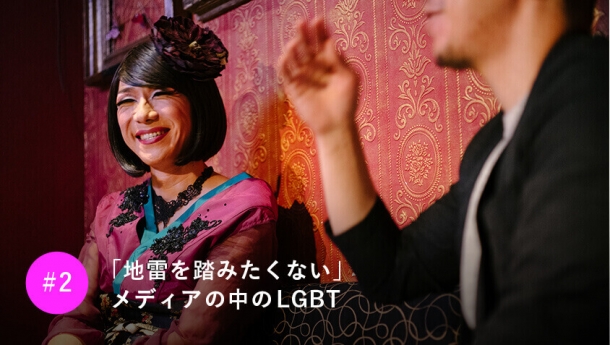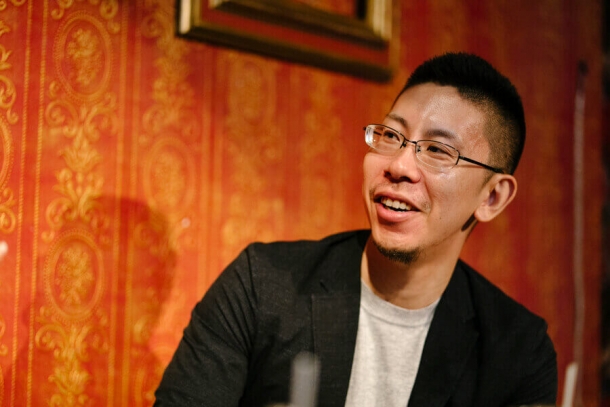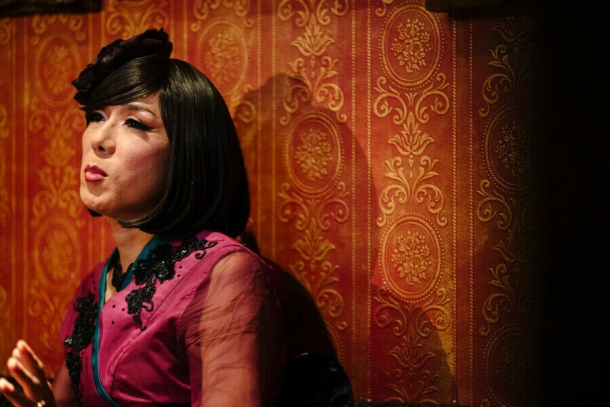
#2 Tiptoeing Around Landmines: LGBT and the Media
Q. The term “onee talent” is commonly used on variety television shows, signaling the rapid acceptance of people referred to as onee. What are your thoughts on this trend?
Bourbonne
The spread of the word “onee” began with the variety television show Onee★MANS (Nippon TV), which started airing in 2006. With this show, the word “onee” became commonplace, and sexual minorities began being accepted. Among those who appeared on the show were Neru Kisaragi, a transgender woman, and Shigeki Majima, who doesn’t cross dress and has not undergone any bodily procedures. All of these people were referred to as “onee.”
Since then, men like Ryucheru and Naoki Ogi, who act in a feminine way but are attracted to women, began to be perceived as “onee chracters.” Even gay men who don’t act overtly feminine starting being referred to as “onee.”
But in the gay community, the word “onee” was originally reserved for people with overtly feminine qualities, gay people with strong “onee” attributes. What’s more, gay men with strong masculine attributes were most popular, so “onee” actually had comical undertones, referring to those who weren’t as popular.
Q. So, if I understand correctly, “onee,” which was originally used to refer to certain members of the gay community, is now used to refer to anyone with overtly feminine attributes, regardless of whether they’re gay, transgender, or straight.
Bourbonne
Ai Haruna, a talent and transgender woman, has embraced the term “onee,” but there are still many transgender people who dislike being referred to by that term.
Q. Over the past 10 years, for better or worse, “onee” has come to refer to a wide range of people, and onee talent have become a staple of variety television programming. Meanwhile, television dramas like What Did You Eat Yesterday? (TV Tokyo), Osan’s Love (TV Asahi), and My Brother’s Husband (NHK), which depict the lives of sexual minorities, mainly gay men, have proliferated. Do you feel like this is evidence that sexual minorities have become accepted?
Caption: This summer, the theatrical adaption of Osan’s Love (TV Asahi), which became a social phenomenon, was met with resounding success, placing among the top ten of the 2018 U-Can Inc. Shingo Ryukogo Taisho Top Awards.
Caption: What Did You Eat Yesterday? (TV Tokyo), based on the original work by Fumi Yoshinaga, which depicts the candid life of a gay couple and their kitchen table.
Moriyama
In a sense, I think that’s true. Just based on my students reactions, I can say that they’re clearly more comfortable with the LGBT community than those who came before them. But, as our observations regarding “onee” show, there’s reason to doubt that everyone has a solid understanding of LGBT.
When we say “LGBT dramas,” we are most likely referring to dramas that depict gay individuals. Others generally focus on transgender women, most notably Joshiteki Seikatsu (NHK). This shows that all components of LGBT — L, G, B, T — have not received equal degrees of acceptance.
For instance, if you ask students what each of the letters in LGBT stand for, some will answer that L stands for “lez.” Even students who are aware of the negative connotations of “homo” and therefore opt to use “gay,” are unaware of the strong, derogatory connotations of “lez.” In these instances, I always insist they use “lesbian” instead.

Q. Now that you point it out, “LGBT dramas” do tend to focus on gay individuals.
Bourbonne
I think it’s a big step that various circles are giving serious attention to issues related to sexual minorities. But it remains to be seen the extent of people’s understanding.
Around the time Mitz Mangrove appeared on the variety show Sunday Japon (TBS), FtM (women who have transitioned to men) talent also began appearing on the show. But while Mitz became a regular guest, the others stopped making appearances.
Men with overtly feminine attributes are seen as “entertaining” in the world of variety shows, but women with masculine attributes are seen as “stylish” or “pretentious.” This is reflected in how men at end-of-the-year company drinking gathering sometimes comically dress up as women, which I think is representative of a certain disdain towards women. It’s hard for them to become popular in the variety-show world.
Q. Bourbonne, you were a supervisor for the show Ore no Skato, Doko Itta? (Where did my skirt go?) (Nippon TV), starring Arata Furuta, which tells the story of a cross-dressing high school teacher. What led to your involvement in the show?
Caption: Ore no Skato, Doko Itta?; Blu-ray & DVD-BOX; Release Date: October 2; From VAP ⒸNTV
Bourbonne
As a supervisor, I met with the director and producers around four times to share basic information about LGBT. Once a draft of the scrip was finished, I looked it over and revised some of Furuta’s lines. I’m around fifty, and I’ve conducted high school classes before, so I could really relate to the part. That’s why I joined.
Moriyama
Leading up to the show’s broadcast, some people, including myself, were worried that the producers of the show recruited Bourbonne simply to have an alibi in case the gay community were to have qualms with the show. If something was inaccurate or insensitive, the producers could simply say, “But this person gave the OK.” However, the show was free of such blunders, and overall, I think it came out quite nicely.
Bourbonne
In 2017, the show Tonneruzu no Minasan no Okage deshita’s (Fuji TV) depiction of a gay character named “Homo Oda Homo” created controversy, and ever since, broadcasting stations have been wary of stepping on another landmine. Because I moderate the Tokyo Rainbow Pride, I think they reached out to me so they don’t do anything offensive, similar to the sentiment you expressed at the beginning of this interview.
Q. As a supervisor, what lines did you revise?
Bourbonne
First I revised some LGBT terminology. I also made suggestions regarding “onee” jokes. For example, in a scene where the teacher encourages a romance between two students, the drafted script used a reference that someone my age would never say. I revised these references to make them more realistic, for example, by changing them to refer to lyrics from the music group Dreams Come True.
Q. 50-year-old-okama realistic. [laughs]
Bourbonne
Exactly. [laughs] In serious parts of the show, when a character says something homophobic, for example, I wanted to alter the script so that the character isn’t simply shut down, but is met with a thoughtful response. However, some of my suggestions reached a bit too far and therefore didn’t make the cut.
That can’t be helped, though. The bigger the media platform, the harder it is to press for precise expressions and passionate declarations on human rights.

After all, these shows are entertainment, and television’s job is to make money off advertisers. Their job isn’t to inform people about the gay community.
Q. In other words, Bourbonne’s role as a supervisor provided a balance within the contexts of entertainment and the LGBT community.
Bourbonne
Yes, everything was a balancing act. From the entertainment perspective, a viewer might get frustrated that the show focuses on politically correct messaging, while from the LGBT perspective, viewers might be dissatisfied with certain expressions. Therefore, I was kind of stuck between a rock and a hard place.
With that said, the most satisfying aspect of working on the show was knowing that young viewers would become a bit more familiar with the LGBT community, and that the show would plant a seed for them to have more consideration for their surroundings. During the broadcast of an episode in which a student comes out as transgender, I saw many junior high students express their support on Twitter.
Teenagers are surprisingly supportive and open to learning about sexual minorities. I am happy to have been a part of that.
[#3] Removing the “Erotic” Will not Eliminate Discrimination



